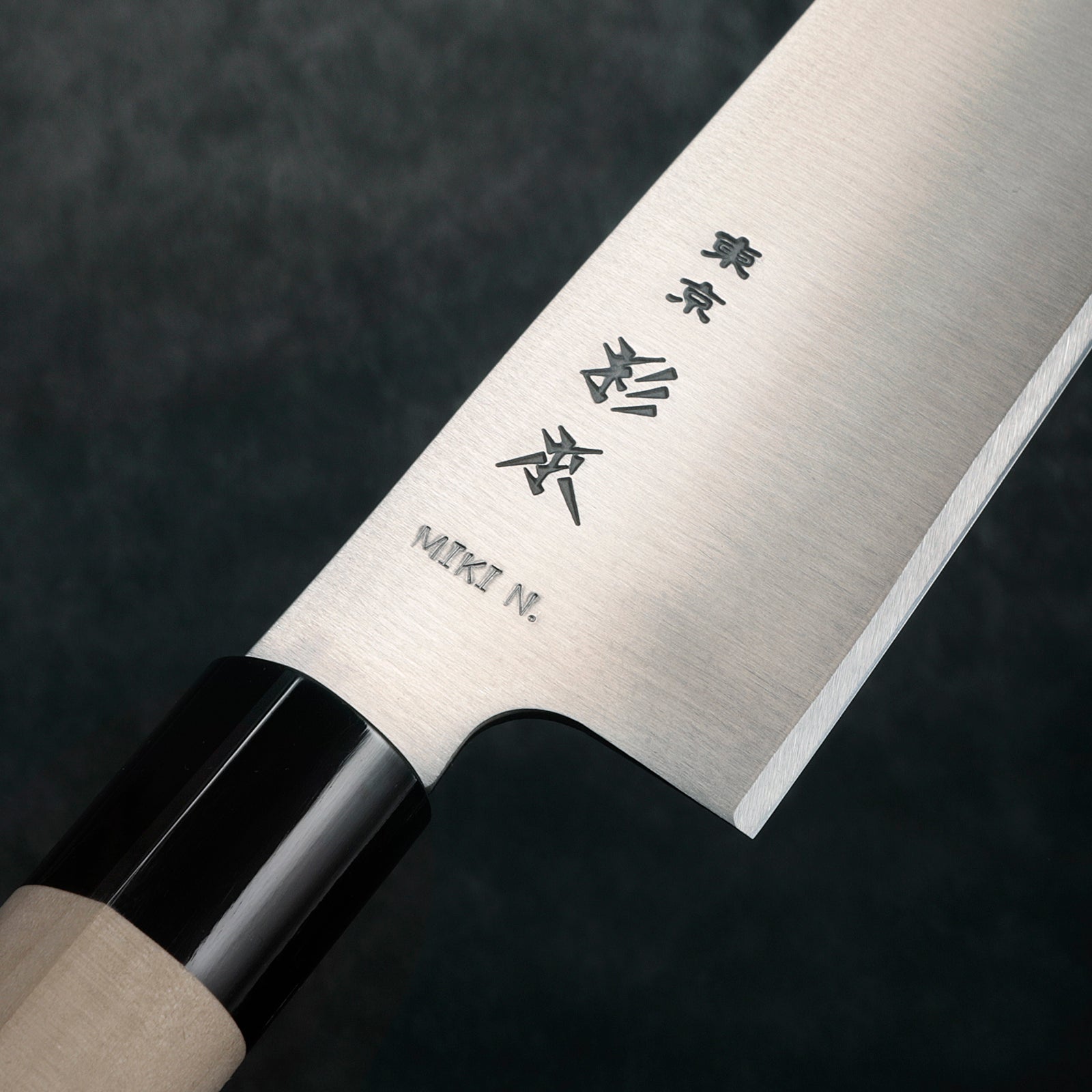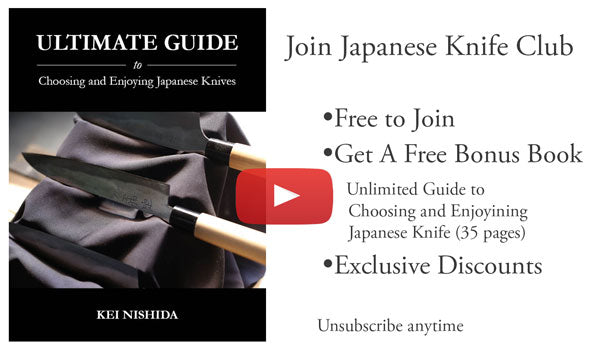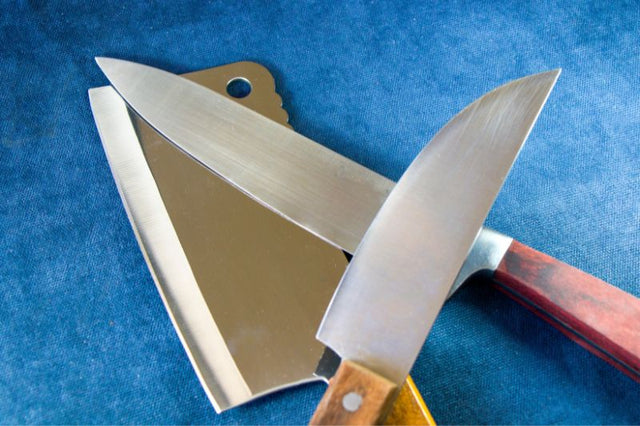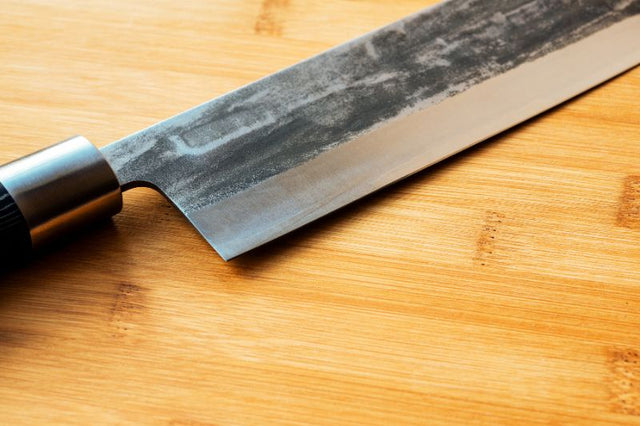Having your knife engraved is a great way to make it uniquely yours. It can also be practical for identifying your knife in a professional kitchen (where someone is bound to borrow your beautiful Japanese knife when you aren't looking). But sometimes, it's challenging to come up with a good idea, especially for a gift. Well, don't worry! Because here are some ideas to get your creative juices flowing.
Name and Commemorate
I’ll begin with several different ideas for name engravings because they are the most practical engraving you can choose. For these, we can suggest a translation into Japanese when you purchase your knife - but you could also have it written in alphabetical characters. Check out the bottom of the article for an explanation of the Japanese writing systems hiragana, katakana, and kanji. For now, let’s look at some name ideas and then a few more that are out-of-the-box.

1. First Name
For many people, whether they've bought the knife for themselves or someone else as a gift, a first name will be the way to go. It's not only a great way to personalize a knife but also convenient for identifying it. It'll also deepen your connection to the knife, increasing your appreciation of its intricate design.
2. Family Name
Have you ever wanted something you could hand down to the next generation? Getting your family name engraved rather than your first name is a great way to share your knife with your children. When the time comes, you can pass the knife on to them.
3. Initials & Acronyms
Keep it short and sweet with some written initials. For example, it could be your initials and a loved one's together to commemorate a special event. Or, what about an acronym to represent your company or something important to you? NASA space knife, anyone?
4. The Artisan or Province Name
A more traditional engraving would be the bladesmith's name who made the knife - or even the name of the province in Japan it comes from. Your imagination will run wild whenever you think about the person who put their love into making your knife. It'll encourage you to keep improving your cooking just as they always strive to improve their craft.
5. Memorial
Sometimes when a beloved person or pet passes away, it can feel nice to keep them with you in some way as a reminder. So, consider imbuing your knife with a little piece of their spirit, so they're always with you.
6. Name Your Knife
It can be fun to build a "relationship" with your knife. Give it its own name for some extra personality. People do this with all sorts of inanimate objects like cars, boats, and other precious things. So, why not a knife? Just don't let anyone catch you talking to your knife; they might get worried!
7. Mark an Occasion
Something as simple as marking an important date on your knife is a great idea. It could be an anniversary gift, birthday gift, or graduation present. Or it could celebrate any other fantastic day that has been life changing.
8. Favorite Words
It doesn't need to be serious just because it's an engraving. You could get your favorite word etched into your knife. It might be the name of a dish you love cooking or an inside joke between you and your friends. Have fun with it - it's not like you're getting a tattoo!
9. Astrological Sign
For the stargazers out there, engraving the name of your astrological sign onto your knife can feel incredibly satisfying. Or look around online for the animal associated with your Japanese zodiac.
10. Religious Passages & Meaningful Texts
Okay, you probably can't fit a whole bible verse on your knife, but you can certainly put the number of your favorite passage. The same goes for the Torah, Quran, or any other holy text. Engraving a small word or number that represents virtues you live by, whether religious or not, can be a great reminder of your values or the things you strive for.
Understanding Japanese Writing Systems
If you've been to any of our knife product pages, you may have noticed that you can choose between having your name engraved in katakana, hiragana, or kanji, which might leave you wondering what this means. Well, Japanese has three different writing systems - or "alphabets." So yes, if you ever decide to learn Japanese, you must learn all three! But what's the difference between them? Let me explain.
● Hiragana (ひらがな)
The most iconic Japanese writing system and the one you will encounter the most in written Japanese, as it is used to write most Japanese words. It is a cursive and beautiful writing system.
● Katakana (カタカナ)
Katakana has the same sounds as hiragana, except that it is used only for writing foreign words, onomatopoeia, or other words that don't translate well into Japanese. It is blocky with straight lines rather than rounded like hiragana.
● Kanji (漢字)
Kanji may appear very similar to written Chinese - well, that's because it's (almost) the same thing. The writing system was adopted from China hundreds of years ago. It is typically used for nouns, verbs, adverbs, and adjectives.
Which System Should I Choose?
All three systems are used together to break up sentences, as written Japanese doesn’t use spaces between words. Here’s an example taken from internationally renowned Japanese author Haruki Murakami's book Kafka on the Shore:
トルストイが指摘しているようにね。 幸福とは寓話であり、不幸とは物語である。
(Translation: As Tolstoy points out. Happiness is a fable, misfortune a story.)
The first sentence utilizes all three writing systems. The word at the start (トルストイ) is the foreign name 'Tolstoy' written in katakana (pronounced 'To-ru-su-to-i'). Then followed by kanji and hiragana. However, when choosing a writing system for your engraving, you don't need to worry about these distinctions so much. Instead, choose whichever writing system you think is the most beautiful, and let us sort out the details for you.
Conclusion

Traditional engraving is an essential element in an authentic Japanese knife; that's why it's a service we're proud to offer. When done for someone else, it adds that special touch to a gift. When done for yourself, it brings you closer to the people and place where the knife came from. Like you, your knife should be unique.
Get Free Bonus Books

Sign up for free to the Japanese Knife Club to get advice and exclusive articles about how to choose Japanese Knives, and tips and tricks for using Japanese knives.
About the author
Kei Nishida
Author, CEO Dream of Japan
Certification: PMP, BS in Computer Science
Education: Western Washington University
Kei Nishida is a passionate advocate of Japanese craftsmanship, a writer, and the founder and CEO of Japanese Knife Co., Japanese Green Tea Co., and Japanese Coffee Co., all part of Dream of Japan.
His journey began with a mission to introduce the world to the exquisite flavors of Japanese green tea. Through Japanese Green Tea Co., he pioneered the import of premium tea grown in nutrient-rich sugarcane soil, earning multiple Global Tea Champion awards. He then expanded into the world of coffee, launching Japanese Coffee Co., the first company to bring Sumiyaki charcoal-roasted coffee to a global audience.
With a deep appreciation for Japanese artistry and tradition, Kei turned his attention to one of Japan’s most revered crafts: bladesmithing. Through Japanese Knife Co., he made handcrafted katana-style knives, created by a renowned katana maker, available outside Japan for the first time. These exceptional knives embody centuries of samurai sword-making expertise, blending tradition with modern functionality for chefs and collectors alike.
Kei’s journey continues as he uncovers and shares Japan’s hidden treasures—one sip, one blade, and one legacy at a time.



















